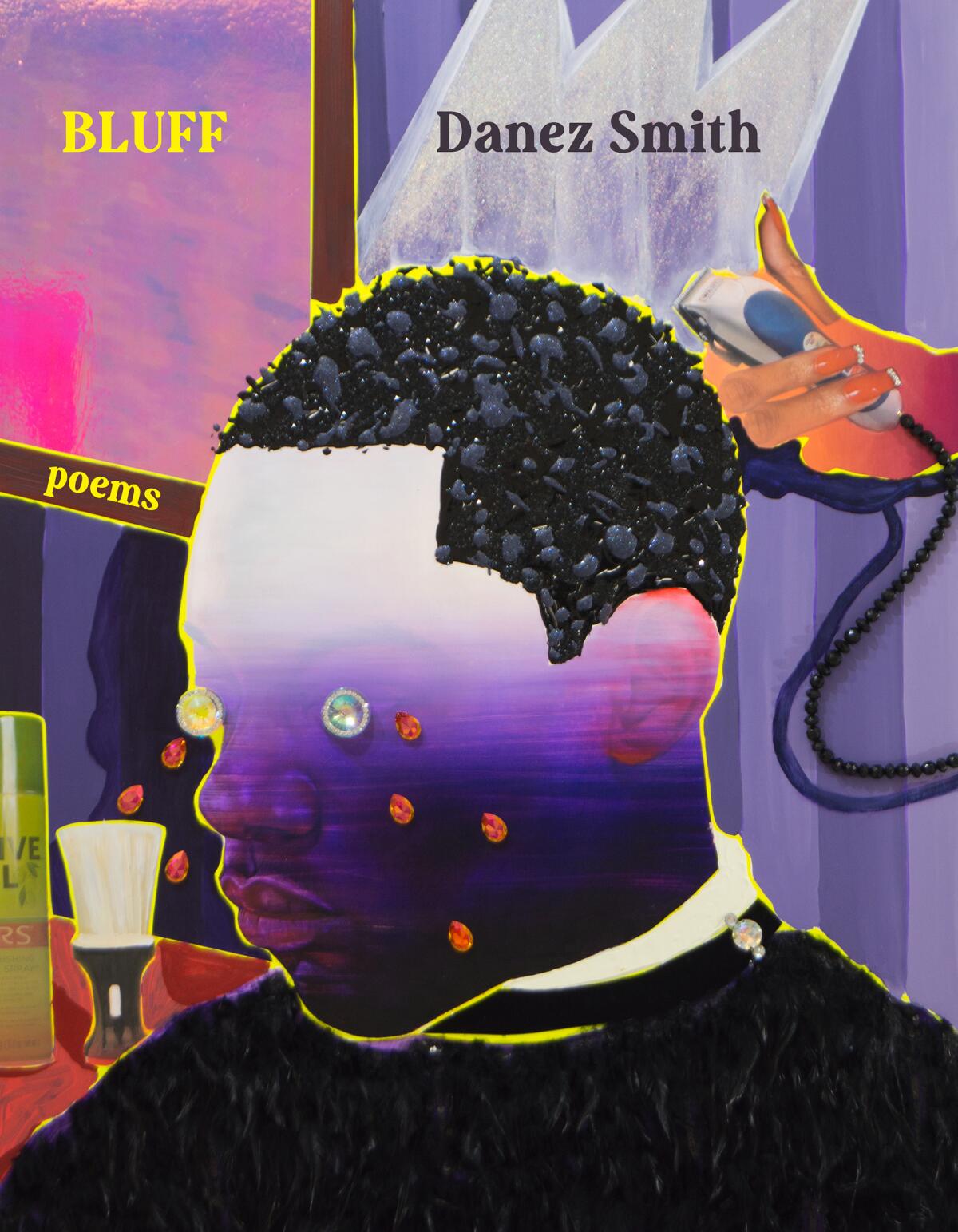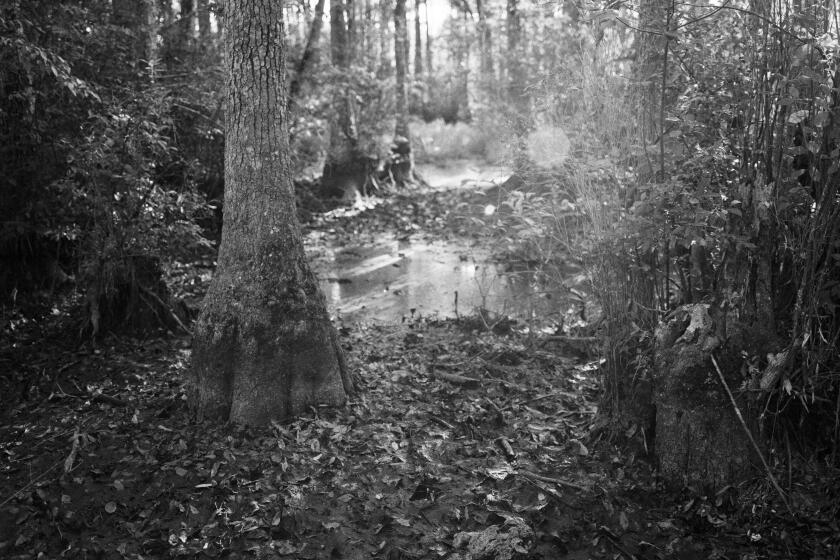Poems of brilliance and beauty, written in the heat of the moment

- Share via
Book Review
Bluff: Poems
By Danez Smith
Graywolf Press: 160 pages, $18
If you buy books linked on our site, The Times may earn a commission from Bookshop.org, whose fees support independent bookstores.
Let’s begin with the title. “Bluff” — the name of Danez Smith’s fourth collection of poetry, and first since January 2020 — represents a cliff or aerie, a high point from which to take a broader view. At the same time, it can also refer, as in poker, to a gesture of deceit.
Each, I suppose, is accurate in its way: The first because, throughout the collection, Smith is seeking a larger reference point, a strategy to make sense of the untenable, and the second because the poet ultimately must reckon with the limitations of their art. “if the cops kill me,” they caution, “don’t grab your pen / before you find / your matches.” To sit in a room writing while the world burns, in other words, is not a revolutionary act.
And yet, what else is there for Smith to do except keep writing? They are a poet, after all. Such a tension leads to a third definition, which emerges in the poem “Dayton’s Bluff” where “bluff” is framed as “dutch for brag.” On the one hand, this reminds us that like any form of art making, poetry can be a self-affirming exercise. Yet what Smith has in mind, it seems, is to peel back the meanings of the word, to excavate its layers and explore “how bragging becomes a lie.”

Among the lies Smith wants us to recognize is slavery, which the Dutch once pursued as a commercial venture with virulent acuity. In “Bluff,” however, that’s not an endpoint but a place to start. Dayton’s Bluff, after all, is a neighborhood in Smith’s home city of St. Paul, Minn., named for speculator Lyman Dayton, who, during the 1850s, developed the location after the Dakota peoples who had once lived there were displaced. “was it dayton’s bluff,” Smith wonders, “meaning a people had to be disappeared off the cliff for his legacy to rise?”
Such a question is epicentral to both “Dayton’s Bluff” and the collection as a whole. In these pages, Smith writes out of the intensity of the moment, while seeking to trace a line back to the past — not because it can provide answers but because it cannot.
“it’s gonna take / too many tomorrows,” they suggest at the end of “relativity,” “to get through / yesterday, i pray for time / to deal with now. no, i pray to Time.” That subtle shift, in response to the italics — capitalizing the “T” after rendering it lowercase in the initial reference — frames time’s move from a concept to a force. Time, Smith is reminding us, is not our friend. If there is an arc of the moral universe, long or short, it may not bend toward justice.
In ‘Earth to Moon,’ the ‘Valley Girl’ singer and daughter of music legend Frank Zappa mixes Hollywood tales with scenes from an often difficult and chaotic childhood.
Consider all that “Bluff” addresses: 2020, height of the COVID-19 lockdown, Derek Chauvin with his knee on George Floyd’s neck in St. Paul. Coming up: the contested election, an insurrection, fomented or prosecuted by a sitting president on Jan. 6.
What Smith will not pray to is politics. “Voted for the negro twice,” they recall in “Last Black American Poem,” referring to Barack Obama, “twice my captor / Wore my face. Admit it, Danez, you loved / Your master in your shade.” The poem is less apologia than ruthless indictment, implying that Smith, like all of us, remains complicit in the unequal nation we have made. “Happy to be able to protest the killing / We couldn’t end,” they continue, “happy for healthcare / That killed us slower, happy the gays could marry / In the country where trans women vanished / Like snow in warm winters.”
In the face of all this, why write poems or make art? “it doesn’t feel like a time to write,” as Smith explains, “when all my muses are begging / for their lives.”
And yet, I want to ask: Why not? It is precisely at the moment when we doubt art, question its value, that it may be crucial to pursue. Smith is writing in a world on fire, the flames unquenchable, with the ignition point deep in our collective past.
An extraordinary historical collaboration sees Nat Turner’s slave rebellion in a prophetic light
Two historians, one living and one dead, believe we misunderstand the forces that drove the most famous slave rebel in American history.
The response, at times, is to step outside poetic forms altogether. The magnificent “rondo” incorporates prose, footnotes and a visual design not unlike a street map to recreate the area once considered “the heart of St. Paul’s African American community.” The not-so-subtle source of trauma is that Rondo was destroyed in the 1950s to make room for an expressway, another example of the dislocations Smith means to evoke.
Such disruptions are societal, but they are also personal, or maybe two sides of a very complicated coin.
“Metro” brings this into three dimensions, eschewing the medium of the page altogether to offer a QR code that opens onto a broken field of lines, divided by what look like telephone area codes. It’s a disquieting set of juxtapositions: those numbers, so quotidian against the fractured scatter of the verse. “less gentle than murder,” the poet writes, “matrimony / was the torture i darted for when the rain / angered in the distance.” Compare that with these lines from “soon”: “no poem / or plea or prayer pulled my papa off his woman / or grandma off the floor.” Matrimony as a battlefield, in other words, family as a crucible. “how bloody is eden’s gate?” Smith wants to know.
Writers are often cautioned not to work out of the heat of the moment, as if what gives their work its focus is a bit of space. The brilliance and beauty of “Bluff” is how effectively Smith does away with that idea. For them, art is not a sanctuary but a battleground, by turns necessary and useless, and never safe and clean. The writing here pulses and pops and fills us with discomfort, exploring the ruptures we all recognize. And why not? Why else bother? Why else put in the work?
“it would be easier,” Smith writes, “if God was dead & we knew it. / then we could get on with it: the final choice of the human: repair or epilogue.”
David L. Ulin is a contributing writer to Opinion. He is the former book editor and book critic of The Times.
More to Read
A cure for the common opinion
Get thought-provoking perspectives with our weekly newsletter.
You may occasionally receive promotional content from the Los Angeles Times.








